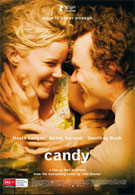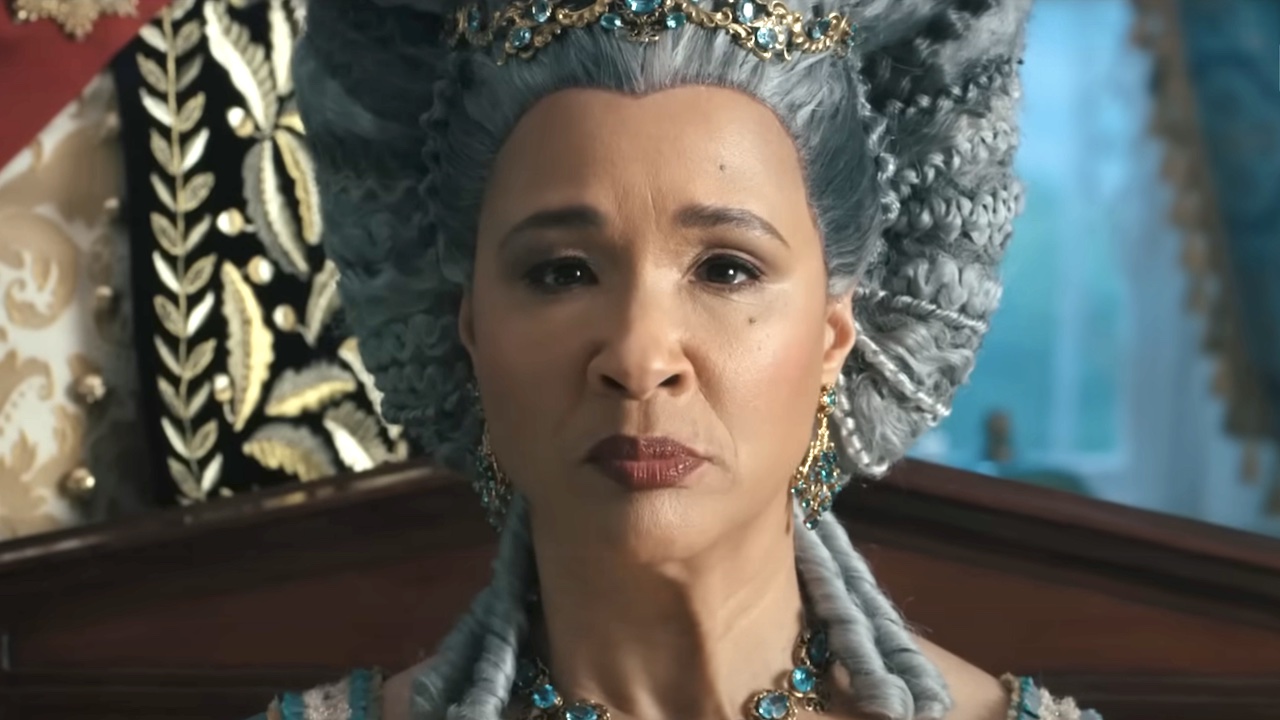One of the most powerful lines in Candy comes from Geoffrey Rush as a heroin addicted chemistry professor warning the script's protagonists about the perils of drug-abuse: "When you can still quit, you don't want to, and when you want to, you can't." Apparently, that theory applies to movies about drugs as well, because Candy is intriguing for the first forty minutes and by the time it goes downhill, you have already spent too much time in the theater to justify bailing.
Candy depicts the powerful and destructive love between aspiring poet and intravenous heroin user Dan (Heath Ledger), and beautiful artist Candy (Abbie Cornish), who sniffs the drug occasionally. The opening sequence, or should I say shameless metaphor, shows Dan and Candy at the blissful beginning of their relationship plastered against the wall of a spinning amusement park ride. We then watch as Candy insists on shooting up the drug like her boyfriend and doesn't bat an eye when she consequently nearly dies from an overdose. As the couple falls deeper into love and addiction, they rely on Casper (Geoffrey Rush), a homosexual chemistry professor who is always happy to dispense cash or drugs to his hopeless friends. As Candy and Dan grow increasingly dependent on Casper, he becomes a sort of father figure to them both, why not when Dan's parents are MIA and Candy's parents (Noni Hazlehurst and Tony Martin) believe it or not, actually disapprove of Candy and Dan's destructive lifestyle - the nerve!
At first, everything is thrilling and sexy as the couple commits petty crime after petty crime to get to their next buzz. But when there is nothing left to hock, Candy has to take drastic measures to generate cash, and her relationship with Dan never recovers. As they fall deeper into addiction, their lives slowly fall apart with intermittent attempts to get clean mixed with disturbing scenes of drug abuse and the horrifying consequences of such. If nothing else, this film may have a place in the after-school-special market, as it definitely does not make heroin look fun.
While the plot brings nothing new to the addiction genre (people do drugs; bad things happen to them,) the acting is quality enough to maintain audience interest, at least for a little while. Abbie Cornish, who may be better known to the world as the girl who might have broken up Reese and Ryan, proves not only that she looks good in the nude, but that she can act too. Her subtle portrayal of Candy manages to evoke what little sympathy an audience can have for a drug addicted young woman who complains about having to prostitute herself but never thinks, "Maybe I should quit using." Ledger also delivers as the passionate junkie Dan, and you can't help but laugh when Dan flat out refuses to sell himself "Brokeback Mountain" style. Overall, Ledger continues to make up for his earlier mistakes like The Order, and proves that he is still Oscar-contender material. However, the real standout performance comes from Geoffrey Rush, whose underplayed Casper steals every moment of screen time in which he appears.
Unfortunately, those choice performances aren't quite enough to rescue Candy from the perils of cliche and underdevelopment. The film starts us right in the heat of Dan and Candy's relationship, both with each other and heroin, but we never understand what drew them to one another and to drug use. Ledger is cute despite his greasy hairdo and women love the bad boy, so we maybe can believe that Candy would fall for him, but she still isn't the poster-child for heroin addiction. Sure her mother is overbearing, but when my mom yells at me for over whipping cream, the first thing that comes into my head certainly isn't, "Hey, maybe I should shoot up some heroin, that'll get her." At the same time, we never see why Dan fell out with his parents or how he came across Casper as his surrogate father. Without understanding where these characters came from, it's hard to feel sympathetic for them, because they both went into drug use willingly and never seem to regret doing so.
The film is broken up into three segments titled "Heaven," "Earth" and "Hell", which also signify the viewer's reaction to each portion. At first, Candy is intriguing and it's hard to look away from the montages of drug use and passionate encounters. But the film jumps from scene to scene without any real plot, leaving everything feeling redundant til you start praying for the characters to either go to rehab, or overdose and die. By the time you get to "Hell", you're pretty sure that you are the one in it as the film never seems to end. When the conclusion finally does arrive, it is impossible to have an emotional reaction because you're too busy feeling sorry for yourself for sitting through it.
Your Daily Blend of Entertainment News

